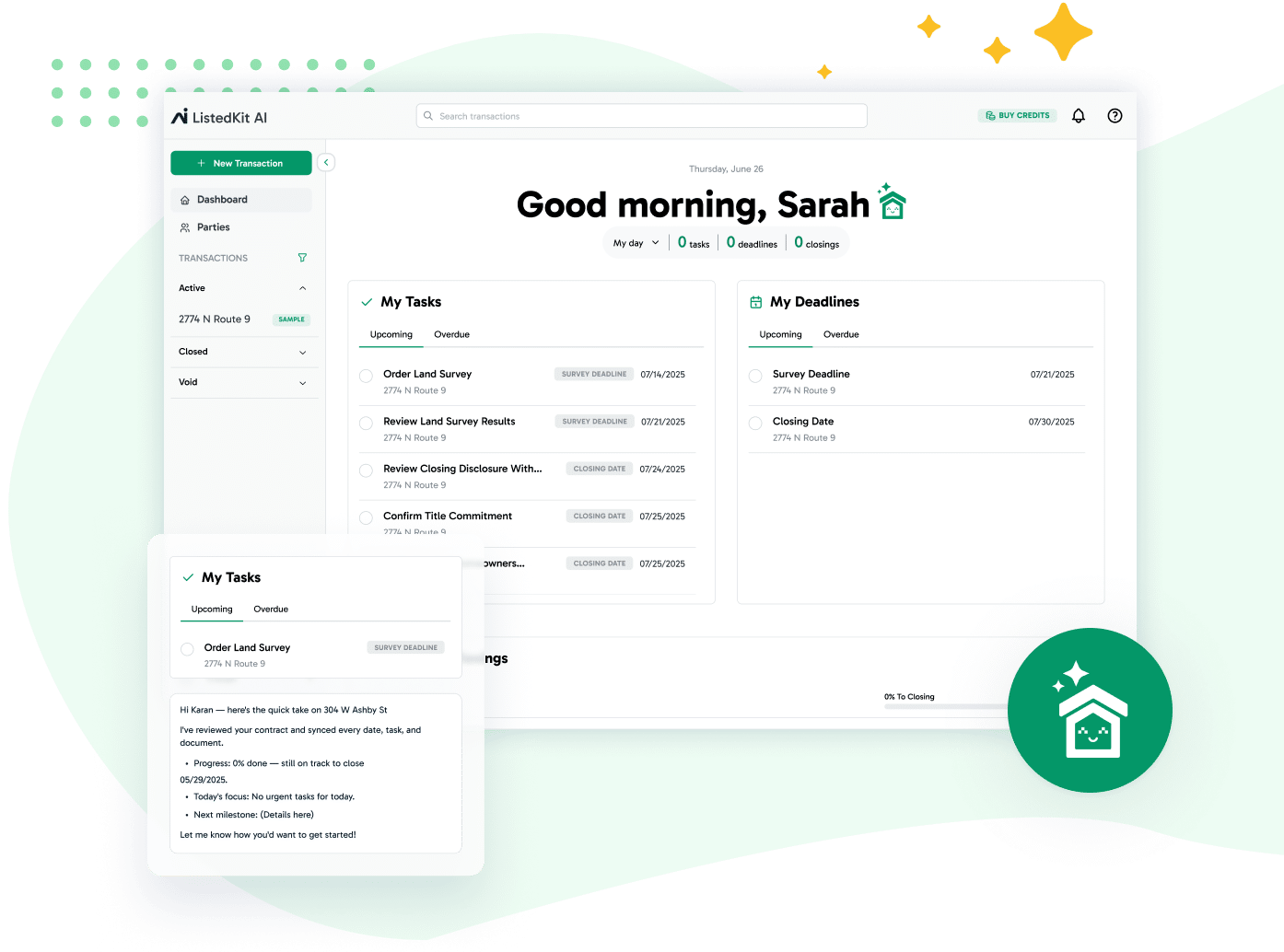The holiday season often brings a quieter period for real estate transactions, offering transaction coordinators a chance to refocus on tasks that may be difficult to prioritize during busier times.
This downtime can fine-tune your skills, enhance your organization, and strengthen your professional relationships. Using this time wisely allows you to position yourself for a more productive and rewarding year ahead.
Here are five actionable ways to make the most of the holiday season.
1. Build on Your Skill Set
As a transaction coordinator, your ability to manage the technical details of real estate transactions while providing consistent support to real estate agents directly impacts their success—and yours.
Investing in your skill set during quieter periods can make a significant difference, allowing you to stand out as a trusted resource in the real estate field.
Deepen Knowledge of Contracts and Compliance
- Focus on identifying common pain points in residential and commercial real estate contracts. Understanding how inspection advisory requirements vary between property types can help you anticipate potential issues.
- Stay updated on regulatory changes that could affect the closing process, like revisions to inspection waivers or title database protocols. This is especially useful when working with real estate professionals who manage a wide range of transactions.
Expand Your Expertise in Commercial Real Estate
- The unique demands of commercial real estate, such as understanding capitalization rates or lease agreements, offer opportunities to diversify your role. Supporting commercial real estate agents requires proficiency in these specialized areas, making your services invaluable for agents working with affluent clientele or real estate investors.
- To deepen your knowledge, consider taking real estate crash courses or online programs focused on commercial real estate investing. A three-month program on commercial leasing or financing structures can be particularly useful.
Strengthen Communication and Negotiation Skills
- Develop concise communication techniques to better assist agents during high-pressure negotiations. For example, practice crafting quick summaries of contract revisions or appraisal process updates to keep real estate agents informed without overwhelming them with unnecessary details.
- Learn to navigate challenges in the closing process, such as resolving disputes over appraisal outcomes or commission checks. Handling these can solidify your reputation as a real estate expert who ensures transactions progress smoothly.
Improve Your Tech Proficiency
- Learn advanced features of transaction management software, particularly those that help synchronize contracts, compliance documents, and timelines for real estate purchases. Tools that streamline daily tasks for buyer clients and agents save time and reduce errors.
- Explore tech-focused Real Estate Courses or Online Programs that cover automation, real estate comps, or integration tools. These can improve efficiency for both you and the agents you support.
Broaden Knowledge of Market Trends and Analytics
- Study mortgage rate trends and their impact on real estate transactions to better support agents dealing with fluctuating buyer demand. For example, understanding how a real estate slump influences buyer clients’ decisions can help you anticipate agent needs.
- Familiarize yourself with Real Estate Bubble concepts and how they affect agents’ long-term planning. This knowledge equips you to provide valuable insights to experienced professionals and agents new to the industry.
2. Create a Plan for Future Growth
Thoughtful planning allows you to set clear goals, streamline your workflow, and prepare for any challenges the real estate market might bring.
By creating a detailed business plan, you can better support real estate agents and brokers while positioning yourself for long-term success.
Define Clear Goals
- Set specific, measurable objectives that align with your agents’ needs. For instance, aim to reduce turnaround times for contract approvals by 20% or expand your capacity to handle transactions for commercial real estate agents.
- Break these goals into quarterly benchmarks, ensuring you can track progress and adjust as needed. This method allows you to stay organized and prioritize effectively throughout the year.
Evaluate Business Expenses
- Review your financials to identify unnecessary costs, such as subscriptions or tools that don’t add significant value. Redirecting these funds toward real estate license courses or online programs can deliver better returns.
- Analyze your income trends to predict potential dips or surges, particularly during fluctuating mortgage rates or a potential real estate slump.
- To maintain business stability during market slowdown, create a contingency plan for financial slowdowns, such as building a reserve fund or negotiating payment schedules with agents.
Optimize Your Daily Tasks
- Assess how you handle recurring responsibilities like tracking commission checks or organizing files. Look for opportunities to automate repetitive tasks, freeing up time for strategic work.
- Evaluate your current workflow for inefficiencies, such as delays in the closing process or miscommunications with agents, and create a streamlined system to address these issues.
- Implement a color-coded or priority-based system for task management. This helps you tackle high-impact responsibilities, like assisting agents with high-value real estate deals, without getting bogged down by smaller daily tasks.
3. Strengthen Your Connections
Strong professional relationships are vital for thriving in the real estate field. The holiday season is a great time to nurture your network and create opportunities for future collaboration.
Reconnect with Past Clients and Agents
- Send personalized holiday greetings tailored to the recipient’s achievements or experiences. For instance, congratulate an agent on their successful year or thank a buyer client for allowing you to assist in their first-time home purchase. Thoughtful touches can make your outreach more memorable.
- Organize a small virtual gathering or webinar for past clients and agents. Use the time to share updates about the real estate market or provide professional advice, such as tips on navigating current mortgage rates. This fosters goodwill and keeps you top-of-mind.
Attend Networking Events
- Expand your sphere of influence by joining virtual or in-person events hosted by organizations or local brokerages. These gatherings offer the chance to meet real estate salespeople, brokers, and commercial real estate agents while broadening your professional network.
- Prepare a concise introduction that highlights your expertise in real estate transactions. For example, share how you’ve helped agents close high-value real estate deals or supported first-time home buyers through complex processes. This positions you as an experienced professional to new contacts.
Collaborate on Future Projects
- Schedule meetings with agents to discuss strategies for the coming year. Topics could include ways to streamline the intake process or attract a wider range of potential buyers.
- Offer to co-develop marketing campaigns tailored to their goals. For example, create a campaign targeting affluent clientele or a neighborhood where real estate purchases are trending. Collaborative projects like these help build trust and ensure mutual success.
4. Organize Your Systems and Processes
Efficiency in managing real estate transactions isn’t just about saving time—it’s about creating a seamless experience for agents and their clients.
Taking time to revisit your systems is an investment in long-term productivity. A clutter-free back-end and well-designed processes can reduce stress and enable you to confidently handle larger volumes of transactions.
Sort Through Digital Files
- Review and archive completed transactions while ensuring that active files are labeled clearly. For instance, separate files by transaction stage (e.g., under contract, in appraisal, or ready for closing) for easier access.
- Consolidate and back up essential data, such as real estate comps or title company information, to avoid losing critical documents during peak periods. Regular backups safeguard your systems and keep your files accessible.
Audit Your Processes
- Evaluate how you manage recurring tasks, like tracking commission checks or updating inspection reports. Identify bottlenecks and create standardized templates or checklists to speed up routine activities.
- Conduct a mock workflow run-through for a typical real estate transaction. This allows you to spot gaps, such as communication delays or errors in compliance documentation, and make necessary adjustments.
Upgrade Your Tools
- Assess whether your current tools integrate well with other software you use, such as CRMs or email platforms. Tools that don’t sync effectively can lead to inefficiencies and unnecessary manual work.
- Explore new technology solutions designed for real estate transactions. For example, test out platforms like ListedKit, which simplifies processes like task tracking, document sharing, and communication with real estate agents and brokers, making your role more efficient.
5. Refresh Your Marketing and Branding
Your marketing and branding speak directly to your skill and proficiency and form the bedrock of trust in estate agents and their clients. Finesse your marketing effort will ensure that your materials and online presence accurately represent your skills and value.
A thoughtful and well-branded TC business keeps you top of mind for them and helps you connect with agents and brokers who align with your vision and goals.
Refine Marketing Materials
- Write a case study of recent success in helping a Commercial Real Estate Agent close a difficult deal or guiding an agent through a tough transaction with potential buyers. A well-designed case study proves your problem-solving abilities and lends credibility to your work.
- Create new business cards or email signatures that reflect the new branding elements, such as a business tagline or logo. This ensures that client-facing materials are consistent and align with the new brand.
Enhance Your Website
- Add an online blog that speaks to real estate professionals on topics such as navigating compliance updates or working effectively with first-time homebuyers. This will boost your SEO and help position you as an expert in the real estate market.
- Make sure to add a downloadable resource—a checklist for the closing process, for example, or a guide to real estate terminology—that will give additional value to the agents who access your site.
Expand Your Social Media Presence
- Host a live Q&A session or webinar via media platforms such as Instagram or LinkedIn regarding the appraisal process or how mortgage interest rates can benefit or hurt real estate transactions. Live, engaging events will have your network continue to grow and invite new followers in.
- It is a great practice to post behind-the-scenes updates on the support you give to agents when filing for a real estate purchase or preparing compliance documents. This demonstrates your worth to potential customers.
Branded Gifts
- Design an e-card or digital gift for the holidays that includes something useful, like a real estate license renewal checklist or a calendar of significant industry dates. This makes the gift customized and reiterates your skill at the same time.
- Consider smaller, functional branded items like USB drives or high-quality pens that agents can use when working on daily tasks. Thoughtful and functional gifts help keep you top-of-mind.
Turning Quiet Time Into a Productive Step Toward Growth
The holiday season is an ideal time to focus on strategies that prepare you for long-term success as a transaction coordinator. By improving your skills, organization, and connections, you set yourself up for a strong year ahead.
Recap of the Five Key Tips:
- Build Your Skill Set: Invest in learning contracts, compliance, and commercial real estate to enhance your expertise.
- Plan for Growth: Set measurable goals and refine your workflow to prepare for market changes.
- Strengthen Connections: Reconnect with agents, attend events and collaborate on projects to expand opportunities.
- Organize Systems: Streamline processes and upgrade tools for more efficient transaction management.
- Refresh Marketing: Update materials, enhance your online presence, and maintain a polished, professional brand.
These steps ensure you’re ready to thrive when the real estate market picks up momentum again. Tools like ListedKit help you stay efficient and focus on growing your business.




